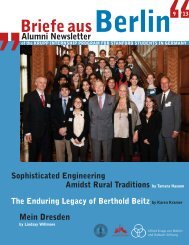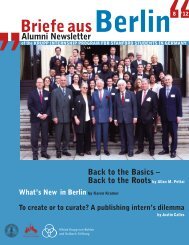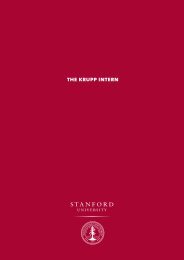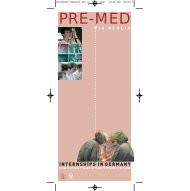Briefe aus Berlin 2009 - Krupp Internship Alumni Newsletter
Briefe aus Berlin 2009 - Krupp Internship Alumni Newsletter
Briefe aus Berlin 2009 - Krupp Internship Alumni Newsletter
You also want an ePaper? Increase the reach of your titles
YUMPU automatically turns print PDFs into web optimized ePapers that Google loves.
In <strong>Berlin</strong><br />
http://www.inberlin-derfilm.de<br />
Der berühmte Fassbinder- und Hollywood-Kameramann Michael Ballh<strong>aus</strong><br />
erlebt mit 73 Jahren, zusammen mit dem Dokumentarfilmer<br />
Ciro Cappellari, sein Regiedebüt: Mit einem „poetischen Filmessay“<br />
über <strong>Berlin</strong>, wo er, in der Charité, geboren wurde und wo er nach 25<br />
Jahren Arbeit in den USA heute wieder lebt und dem studentischen<br />
Nachwuchs hilft. Prominente und unbekannte Protagonisten zeigen<br />
ihm ihr <strong>Berlin</strong>: der Kioskbesitzer Ercan Ergin, die GRAFT-Architekten,<br />
die Künstlerin Beate Gütschow, die Sch<strong>aus</strong>pielerinnen Angela<br />
und Nele Winkler, Christoph Schlingensief, Frank-Walter Steinmeier,<br />
Kl<strong>aus</strong> Wowereit. Ballh<strong>aus</strong>’ Lebensmotto lautet „Alles wird gut“. Das<br />
scheinen zumindest diese <strong>Berlin</strong>er auch zu glauben, aber ...<br />
Résiste! Aufstand der Praktikanten<br />
http://www.tillschmerbeck.de<br />
Nun bekommt auch die „Generation Praktikum“ ihren Film: schlechte<br />
oder überhaupt keine Bezahlung, mangelnde Betreuung und Ausbildung,<br />
falsche Jobversprechen sind vielbeklagte Mängel im deutschen<br />
Praktikantengeschäft. Der Regisseur Jonas Grosch interpretiert<br />
das ernste Thema in seiner Abschlußarbeit an der Hochschule<br />
für Film und Fernsehen Potsdam komödiantisch: Ehemalige Praktikanten<br />
gründen eine Praktikanten-Beratungsfirma. Im Streit um deren<br />
Wertorientierung geraten ein Yuppie und eine politische Aktivistin<br />
aufeinander. Der Konflikt mit der großen Wirtschaft scheint<br />
nur mit einer typisch französischen Idee lösbar – mit einem Praktikanten-Generalstreik!<br />
Groschs Schwester, Katharina Wackernagel,<br />
vielen bekannt als vermeintliche Fußballignorantin in „Das Wunder<br />
von Bern“, spielt eine der Hauptrollen.<br />
Filmportale<br />
deutscher und internationaler Filme, Filmliteratur u.a.:<br />
http://www.filmportal.de<br />
http://www.film-zeit.de<br />
http://www.kinofenster.de<br />
http://www.bpb.de Publikationen/ Filmhefte<br />
Deutsches Fernsehen in den USA:<br />
http://www.germankinoplus.com<br />
Überblick über <strong>Berlin</strong>er Filmfestivals<br />
http://www.festiwelt-berlin.de<br />
Stanford in <strong>Berlin</strong> on Video<br />
http://bosp.stanford.edu/berlin/movie.html<br />
Stanford Alumnus George Will (‘55), who has been a generous supporter<br />
of the <strong>Berlin</strong> Center for decades, recently commissioned Peter Dollé,<br />
Reporter for the Deutsche Welle, to do an outreach video on Stanford- in-<br />
<strong>Berlin</strong> to be shown to prospective students and interns. Dollé spent many<br />
hours interacting with students in order to capture life as they live it in<br />
<strong>Berlin</strong>. We hope this 14-minute film will bring back memories of your<br />
studies and internships here.<br />
Neues <strong>aus</strong> Essen (I)<br />
The British architect David Chipperfield<br />
is not only responsible for the reconstruction<br />
of the Neues Museum in<br />
<strong>Berlin</strong> but also for the design of the<br />
new building of the Museum Folkwang<br />
in Essen which will be reopened in January<br />
2010. The huge project has been<br />
financed by the <strong>Krupp</strong> Foundation, a<br />
long time supporter of the museum. The<br />
photograph shows the new entrance court<br />
(source: Museum Folkwang/NMFE<br />
GmbH/ Wolf Haug <strong>2009</strong>). http://www.museum-folkwang.de<br />
13<br />
,ihr habt mir ein h<strong>aus</strong> gebaut‘<br />
Wolfgang Hilbig<br />
ihr habt mir ein h<strong>aus</strong> gebaut<br />
laßt mich ein andres anfangen.<br />
ihr habt mir sessel aufgestellt<br />
setzt puppen in eure sessel.<br />
ihr habt mir geld aufgespart<br />
lieber stehle ich.<br />
ihr habt mir einen weg gebahnt<br />
ich schlag mich<br />
durchs gestrüpp seitlich des wegs.<br />
sagtet ihr man soll allein gehn<br />
würd ich gehn<br />
mit euch.<br />
This poem emphasizes an individual’s longing for independence,<br />
a theme with which the East German author Wolfgang Hilbig<br />
began his first published poetry collection under the title “abwesenheit”<br />
in 1979. It has been called a “Trotzgedicht”; it was<br />
written in 1965, the year when many Eastern German artists<br />
were robbed of the temporary illusion that the erection of the<br />
<strong>Berlin</strong> Wall would provide a protected space in which more artistic<br />
and political freedom would be tolerated, as it would shield<br />
the East German public sphere from immediate conflicts with<br />
“the West;” as became clear within a few short years, the closure<br />
of the border had just the opposite effect. The paternalistic<br />
state from which Hilbig distanced himself punished him for both<br />
the book’s content and bec<strong>aus</strong>e it was published “illegally” in<br />
the West. In the years to come, only one of his books was to appear<br />
in the GDR. Hilbig (Meuselwitz near Leipzig 1944 – <strong>Berlin</strong><br />
2007), for a long time a “schreibender Arbeiter,” had taken<br />
the political call for literary treatment of work and labor in the<br />
“Arbeiterstaat” too seriously; his literature was too candid. In<br />
1985 he received a permanent visa and moved to Western Germany;<br />
though it never became home, over time he did receive increasing<br />
recognition and many literary awards. In particular, his<br />
book “Provisorium” (2000) describes an unhappy existence between<br />
East and West. His analysis of the eroding counsciousnees<br />
of a writer who spies for the Stasi in the underground of<br />
<strong>Berlin</strong> in the novel “Ich” (1993) is seminal. However, Hilbig’s<br />
significance goes far beyond his reflections on the conflict between<br />
work and labor on the one hand and (his) writings on the<br />
other hand. In dense poetry and prose he captured the end of traditional<br />
heavy industry in its East German variant, 85% which<br />
was based on brown coal with a yearly production of more than<br />
300 million tons, with grave consequences for the landscape and<br />
the environment. Coal and carbon dust is the recurrent theme of<br />
this poet, a strong man who in his day job worked as a mechanic<br />
and as a fireman.<br />
Hilbig’s complete works are now available from the publisher<br />
S. Fischer, which also published “abwesenheit”; it contains<br />
both previously published and unpublished poetry, including the<br />
text printed above. Wolfgang Hilbig: Gedichte. Mit einem Nach -<br />
wort von Uwe Kolbe. In: Wolfgang Hilbig. Werke. Hg. v. Jörg<br />
Bong, Jürgen Hosemann und Oliver Vogel. Frankfurt a.M.: S.<br />
Fischer 2008, S. 10.








